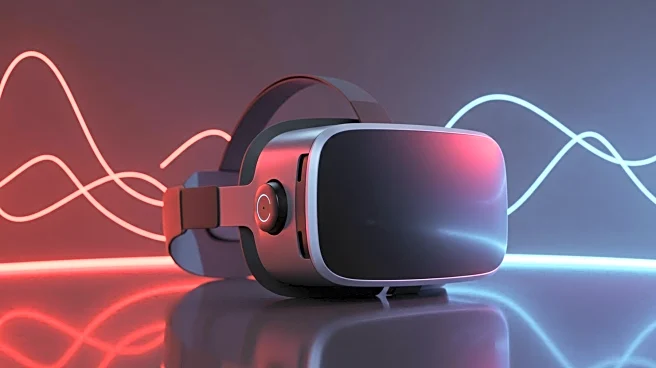What's Happening?
Pico 4 Ultra, a virtual reality headset developed by ByteDance, has introduced new features including Travel Mode and enhanced body tracking using five Pico Trackers. Travel Mode, initially launched on Apple Vision Pro and later adopted by Meta Quest headsets, allows the headset's positional tracking to function accurately in moving vehicles like planes and trains. This feature addresses the issue of virtual objects drifting due to vehicle movement. Additionally, Pico has enhanced body tracking capabilities by supporting up to five Pico Trackers, which can be strapped to the user's forearms or thighs for improved tracking accuracy. This development is particularly beneficial for VR experiences requiring precise leg and arm movements, such as dancing and fitness applications.
Why It's Important?
The introduction of Travel Mode and enhanced body tracking in Pico 4 Ultra represents significant advancements in virtual reality technology. Travel Mode enhances user experience by ensuring stable positional tracking in dynamic environments, which is crucial for VR applications used during travel. Enhanced body tracking with multiple trackers allows for more accurate representation of body movements, improving the realism and interactivity of VR experiences. This could lead to increased adoption of VR technology in sectors like fitness, gaming, and social interactions, where precise body movement tracking is essential. The advancements also position Pico 4 Ultra as a strong competitor to other VR headsets, potentially influencing market dynamics and consumer choices.
What's Next?
Pico's continued innovation in VR technology may prompt other companies to enhance their own offerings to remain competitive. The success of these features could lead to broader adoption of VR in various industries, including entertainment and education. Additionally, Pico's advancements might encourage developers to create more applications that leverage enhanced body tracking and travel capabilities, expanding the VR ecosystem. As VR technology becomes more sophisticated, it may also drive discussions on the ethical implications of virtual interactions and the need for regulations to ensure user safety and privacy.
Beyond the Headlines
The development of enhanced body tracking and travel mode in VR headsets like Pico 4 Ultra could have long-term implications for how people interact with technology. As VR becomes more integrated into daily life, it may influence cultural norms around travel and social interactions. The ability to accurately track body movements in VR could also lead to new forms of expression and communication, potentially transforming how people connect and collaborate across distances. Furthermore, these advancements may raise questions about the impact of prolonged VR use on physical health and the importance of balancing virtual and real-world experiences.









